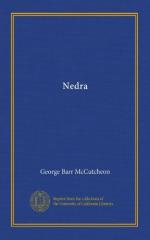A fever of queer emotions plagued Hugh’s mind as he sought sleep that night. He lay awake on his couch of skins for hours, striving to put from himself the delightful conviction that had presented itself so suddenly. Through all his efforts to convince himself that his impressions were the result of self-conceit or a too willing egotism, there persistently ran the tantalizing memory of her simple confession. When at last he slept it was to dream that a gentle hand was caressing his forehead and loving fingers were running through his hair. For a while the hand was Grace Vernon’s, then it was Tennys Huntingford’s, then Grace’s, then the other’s. Its touch brought a curve to his lips.
While he lay awake in these wondering hours and slept through the changing dream, the cause of his mingled emotions lay in the next apartment, peacefully asleep from the moment her head touched the pillow, totally unconscious of the minutest change in her heart or in their relationship, as contented as the night about her.
The next morning he was speculatively quiet and she was brightly talkative as they ate breakfast. He was awake when she took her refreshing plunge in the pool, and heard her conversing learnedly with her attendants, as if they understood all that she said—which they did not. It was then that he thought what a solitude life would be if she were not a part, of it. There was nothing in her manner to indicate that she remembered their conversation of the night before. In fact, it was apparent that she was wholly unconscious of the impression it had made.
Two of her white-robed attendants stood in the doorway while they ate, another industriously fanning them. The flowing white robes were innovations of the past few days, and their wearers were pictures of expressive resignation. Robes had been worn only by Mozzos prior to the revolution of customs inaugurated by the white Izor, and there was woeful tripping of brown feminine feet over treacherous folds.
“Those ghastly gowns remind me that this is the day for our flag raising,” said he. “I guess the banner is strong enough to stand the winds that whistle around the tops of the gateposts, isn’t it?”
Her thoughts reverted to the white signal that floated from the summit of the big mount at whose base they had been cast up from the sea. Hugh, having completed the meal, went to the end of the room, where, stretched along the wall, hung a huge American flag. Days had been consumed by the women in the manufacture of this piece of woven grass. He had created red stripes from an indelible berry stain. A blue background for the stars was ingeniously formed by cutting out spaces through which the sky could gleam. A strong pole lay on the floor and all was in readiness for the raising of the Stars and Stripes over the Island of Nedra. Their hope was that it might eventually meet the eye of some passing navigator.
“By the way, Hugh,” she said, standing beside him, a trace of antagonism in her voice, “who discovered this island, a Briton or an American?”




